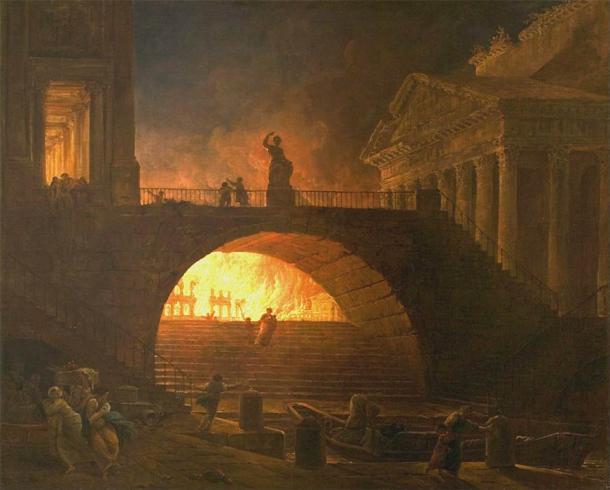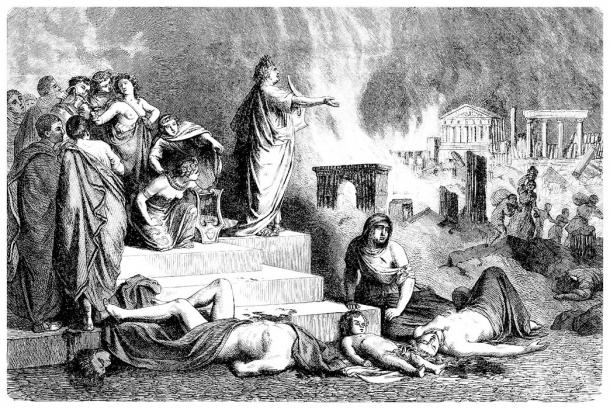History is constantly being rewritten and sometimes the bad guys of ancient times are proven to be better than we were led to believe. In a new book by a British archaeologist and historian, Emperor Nero is shown to be a social hero, and the author claims his successors greatly “exaggerated” the damage caused by the Great Fire of Rome.
Lucius Domitius Ahenobarbus, better known as Nero (37-68 AD), was the fifth Roman emperor. He is associated with the mass-persecution of Christians, decadence, excess, and conspiratorial political murders. Nero’s legendary passion for music was so deep that ancient historical rumors pictured him “fiddling” away during the Great Fire of Rome in 64 AD, four years before he killed himself.
While Nero is traditionally blamed for Rome’s great fire, a British professor now claims that the blaze “was an accident” and presents an entirely new take on the controversial emperor. And contrary to causing the fire and failing to save the city, Nero actually handled the disaster “relatively quite well.”
How The Fire Ended Nero’s Life And Led To A New Lineage
Professor Anthony A. Barrett of the University of British Colombia recently published “ Rome is Burning .” Barrett claims Nero was “not” to blame for Great Fire of Rome in 64 AD. The researcher’s conclusions are primarily based on archaeological evidence, which suggests only about “15 – 20 per cent of the city was actually destroyed, much less than the purported 10 of 14 municipal districts.”

The Great Fire of Rome portrayed in an 18th-century painting by a French artist. (Hubert Robert / Public domain )
The Great Fire of Rome mostly destroyed the lush Palatine and Esquiline hills where the upper classes lived. While Nero was celebrated as a hero of the lower classes he was equally, if not more so, detested by the Roman elite who had to pay for rebuilding the city after the fire.
On the 9 th of June, 68 AD, at the age of 30, the Emperor Nero became the first Roman ruler to take his own life. After his suicide, Nero’s Flavian successors grossly exaggerated the fire damage “to tarnish his legacy” because the Flavians didn’t have a direct lineage connection with the first emperor Augustus. Nero was Augustus’s great-great grandson.

This ancient drawing shows Nero singing during the Great Fire of Rome. And, based on the newest book about him, he was wrongly blamed for the fire and its overall subsequent financial burden. ( Erica Guilane-Nachez / Adobe Stock)
The Roman Elite Hated Paying For Expensive Social Programs
The most affected areas of Rome in the Great Fire of Rome were also the most affluent areas of the city. And because the fire destroyed many palatial Roman residences the elite all blamed Nero for their misfortune.
According to a report in the Daily Mail , Rome’s upper classes became even angrier with Nero when taxes were raised to fund repairs after the fire. However, Professor Barrett’s new book points out that while Nero’s rule allowed the elite to get richer and richer the emperor could do no wrong. But as soon as they had to cough up for the repair project “the mood soured among the rich and powerful of Rome.”
Professor Barrett told The Times that the Great Fire of Rome “triggered a significant anti-Nero movement and created a vast divide between the ruler and his influential subjects,” which culminated in the ruler’s suicide. The propaganda narrative after Nero’s death was that he “initiated the Great Fire of Rome to build his enormous palace.” But speaking out for Nero, Barrett found “very little to fault him with,” and he goes so far as to suggest that Nero’s hands-on response helped to limit the fire’s destruction.
The New Book About Nero Sets The Record Straight
Professor Barrett’s book explains that after the Great Fire of Rome Nero led a committee that decided on a set of updated building regulations aimed at preventing the spread of future fires. This likely also antagonized the Roman elite while they were dipping deep into their savings to pay for the post-fire reconstruction. Moreover, Nero implemented new social welfare systems, providing shelter for the poor who were made homeless and displaced by the fire. All these extra costs had to be paid for by Roman aristocrats, traders and merchants, which ultimately resulted in immense pressure on Nero and his eventual suicide.
While ruling, like in death, Nero is remembered for having destabilized the entire Roman Empire. His low tax regime combined with his lavish spending and slack governmental control sparked an economic recession that constantly alienated the elites of Rome. However, Nero should perhaps be thought of as more a leader for the people, than a ruler of the people. And Barrett’s book makes all this so clear that we are left with admiration and respect for Nero overall.
Top image: After the Great Fire of Rome and Nero’s suicide, the Flavian dynasty took over and went on a building spree in Rome. The Colosseum and the distraction of the “games” was the Rome that followed Nero’s rule, which according to the latest book about him wasn’t at all what history has taught us. Source: XtravaganT / Adobe Stock
By Ashley Cowie
Related posts:
Views: 1
 RSS Feed
RSS Feed

















 November 13th, 2020
November 13th, 2020  Awake Goy
Awake Goy  Posted in
Posted in  Tags:
Tags: 

















Rome was burned down by a Jew zealot named Chrestus or Chrestos (Christ in Greek is Chrīstós) Some maintain that he was the “Christ” we now know today. And Nero was lied about, just as the Romans in general were lied about by the Jew. They continue to lie today. Nero rebuilt Rome and his ‘notoriety’ was greatly exaggerated by guess who?